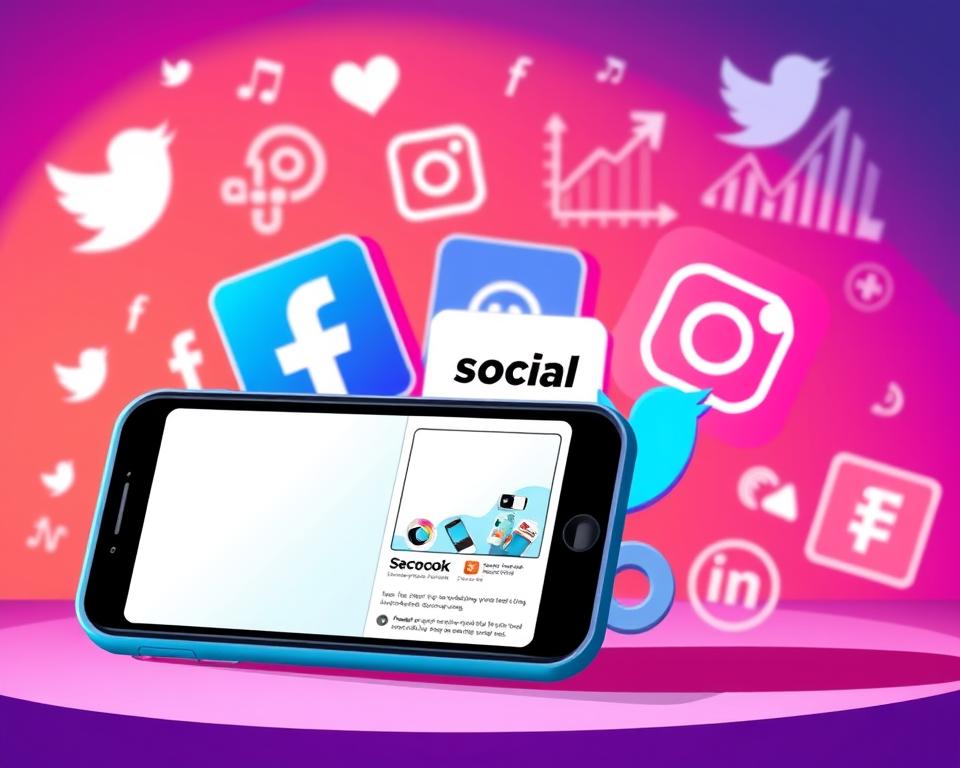1on1 Marketing: Access Individualized Customer Connections.
Ever ponder why some brands connect deeply with their audience while others falter? The secret lies in 1on1 Marketing, a game-changing method that turns generic marketing into personalized experiences. By zeroing in on personal preferences, it forges a bond that mass marketing simply can’t replicate. It repositions the focus from one-size-fits-all messaging to tailored tactics that talk directly to each customer’s core.
By adopting 1on1 Marketing, businesses can build more meaningful connections. They can craft marketing plans that truly resonate with their audience. This section explores the core of 1on1 Marketing, showing how it enables brands to engage with customers on a more personal level, company website.
Marketing Strategy Evolution
The marketing landscape has seen a significant transformation over the years. Initially, marketers used one-size-fits-all strategies, relying on broad messaging for average consumer behavior. Today, the market demands a focus on customer engagement through tailored dialogues. This shift emphasizes the need to understand each customer as an individual, not just part of a group.
With marketing’s evolution, it’s clear that generic tactics no longer cut it. Today’s methods focus on fostering real relationships rather than simply selling products. Marketers now use data insights to inform their approach, moving towards personalized tactics that meet unique customer needs.
Such evolution not only deepens customer bonds but also boosts loyalty and retention. In a world where consumers face endless choices, brands that offer personalized experiences stand out. They craft platforms for dialogue and engagement, ensuring customers feel valued.

| Strategy Type | Characteristics | Example |
|---|---|---|
| Generic Approach | Mass targeting, wide reach | Mass email blasts |
| Tailored Tactics | Individual focus, precision targeting | Segmented email flows |
The Importance of Personalization in B2B Marketing
The B2B marketing landscape is rapidly changing, making personalization essential. Professionals seek to improve conversions via personalized 1on1 strategies. Research indicates that numerous view this as critical for retention. In today’s fast-paced world, connecting with audiences through effective engagement is critical.
Personalized marketing tackles the challenge of grabbing attention. It ensures content resonates with each customer’s unique preferences. This focus on individual experiences helps brands stand out in crowded markets.
As touchpoints multiply, the demand for personalization grows. Brands that adopt personalized strategies meet customer needs and build lasting connections. Such an approach offers a distinct advantage in today’s market.
Defining One-to-One Marketing
One-to-one marketing is about tailoring experiences to meet each customer’s unique needs. It uses data insights to craft personalized engagement strategies. By concentrating on individual experiences, it fosters robust customer bonds.
For example, a coffee shop where the barista remembers a customer’s favorite order illustrates one-to-one marketing. This small act shows how paying attention to preferences can boost satisfaction. It transforms a routine purchase into a memorable experience, enhancing loyalty.
Implementing one-to-one Marketing requires a deep dive into customer data. They analyze behaviors and preferences to tailor their messages. This guarantees marketing efforts hit the mark with distinct tastes, yielding stronger connections and greater satisfaction.
As companies pursue personalized engagement, they recognize that customization underpins lasting success. Those who excel in creating individualized experiences gain significant benefits from their efforts.
Advantages of Tailored Engagement
Personalized customer engagement brings numerous benefits to modern brands. It significantly increases satisfaction by delivering experiences that align with individual needs. Research reveals that 80% of consumers favor brands offering customized interactions. This highlights the significant impact of customized marketing.
Loyalty programs that incorporate personalization tend to retain customers better. By targeting distinct pain points and tastes, companies foster a sense of being valued. This connection fosters repeated purchases, driving profitability.
Tailored marketing results in better conversion rates. Tailored recommendations and targeted content guide customers through the sales funnel, improving their journey from consideration to purchase. Highlighting the benefits of personalized marketing enhances brand perception and positions businesses for success in a competitive market.
| Benefit | Description | Impact |
|---|---|---|
| Happy Customers | Personalized experiences improve overall customer happiness. | Higher chances of repeat purchases. |
| Rewards Tailored to You | Custom offers increase customer engagement. | Enhanced retention and brand loyalty. |
| Conversion Rates | Targeted content spurs customer actions effectively. | Boost in sales and revenue. |
Personalization Challenges
Implementing tailored marketing presents several challenges. Collecting quality data is a primary obstacle. Robust data is essential for effective segmentation. Without this, campaigns miss the mark, squandering opportunities and resources.
Companies must balance personalization with broad messaging. Large corporations often find it hard to maintain one-to-one interactions while heavily relying on automation. This can result in losing the personal touch that customers cherish. – Marketing 1on11on1
Small businesses face unique barriers too. They may lack clear messaging, limiting their personalization efforts. Acknowledging these hurdles is crucial for refining strategies and boosting engagement.
Tools Fueling Personalized Marketing
Groundbreaking technologies in marketing are reshaping the realm of personalized customer engagement. CRM systems are pivotal for managing customer data. They help businesses manage customer data, vital for creating tailored marketing experiences. A robust CRM system allows companies to grasp customer preferences and behaviors more deeply.
AI in marketing improves personalization by enabling more accurate targeting and automating tasks. ML algorithms analyze large datasets to reveal trends and behaviors. This enables marketers to refine their strategies. Such automation cuts down on manual work and boosts the effectiveness of marketing campaigns.
Research shows 72% of marketers rely on CRM for personalization. 55% use automation tools to streamline campaigns. These tools enable large-scale customization. This ensures marketing efforts connect with individual consumers, avoiding generic messages.
Merging these tools creates a dynamic engagement framework. The fast-evolving scene drives adoption of cutting-edge tech. These tools not only improve efficiency but also strengthen connections with their audiences.
Personalization Best Practices
Successful personalization rests on core best practices. These ensure that efforts resonate with the audience, leading to better engagement. Key components include:
- Audience segmentation is essential for targeting specific groups based on common traits. It enables precision messaging, increasing engagement rates.
- Using optimized messaging improves the customer experience. Consistent, relevant communication across channels builds trust and encourages continued interaction.
- Adopting experimental approaches, like A/B testing, is critical. It helps pinpoint the most impactful marketing approaches by comparing different messages and metrics.
Leveraging customer data is crucial to grasp behaviors and preferences. Regular analysis refines strategies. By adhering to these best practices, brands can craft a personalized approach that resonates with their target audience.
Creative Ways to Personalize
Creative marketing strategies are key to improving personalized experiences at every customer touchpoint. Companies send emails tailored to tastes, amplifying impact. By studying past purchases, companies can suggest products that feel right, boosting sales.
Segment-specific videos are another effective tactic. They capture attention and build emotional bonds with viewers. Adaptive loyalty programs that align with behaviors reward meaningful interactions, enhancing the journey.
| Creative Tactic | Description | Benefit |
|---|---|---|
| Tailored Emails | Emails crafted to individual preferences and behaviors. | Increases engagement and conversion rates. |
| Suggested Products | Suggestions based on previous purchases and browsing history. | Enhances sales and customer satisfaction. |
| Segmented Videos | Video content designed for specific segments. | Strengthens brand connection and engagement. |
| Loyalty Programs | Rewards systems that adapt to individual behaviors. | Drives loyalty and repeat business. |
Companies gain significantly by weaving customized offers into social media, email, and app alerts. Each interaction is a chance to show the brand’s dedication to personalized marketing. It creates memorable experiences, making brands stand out in a crowded landscape.
Future Trends in 1on1 Marketing
The world of 1on1 marketing is rapidly changing, driven by the latest marketing trends. Marketers will use AI to create personalized campaigns that meet individual needs. This approach boosts marketing success and builds stronger customer connections by delivering the right content at the right time.
Omnichannel experiences are another key trend. Customers now expect a smooth journey across different platforms, from social media to emails. Brands must maintain uniform messaging to satisfy these demands. Understanding where and how customers interact helps create a unified experience, strengthening brand loyalty.
In response, ethical data usage will be vital for preserving consumer trust. Amid rising privacy concerns, transparency and responsibility in data handling are non-negotiable. Prioritizing ethical practices meets regulations and cultivates trust, paving the way for loyal relationships in one-to-one Marketing’s future.

